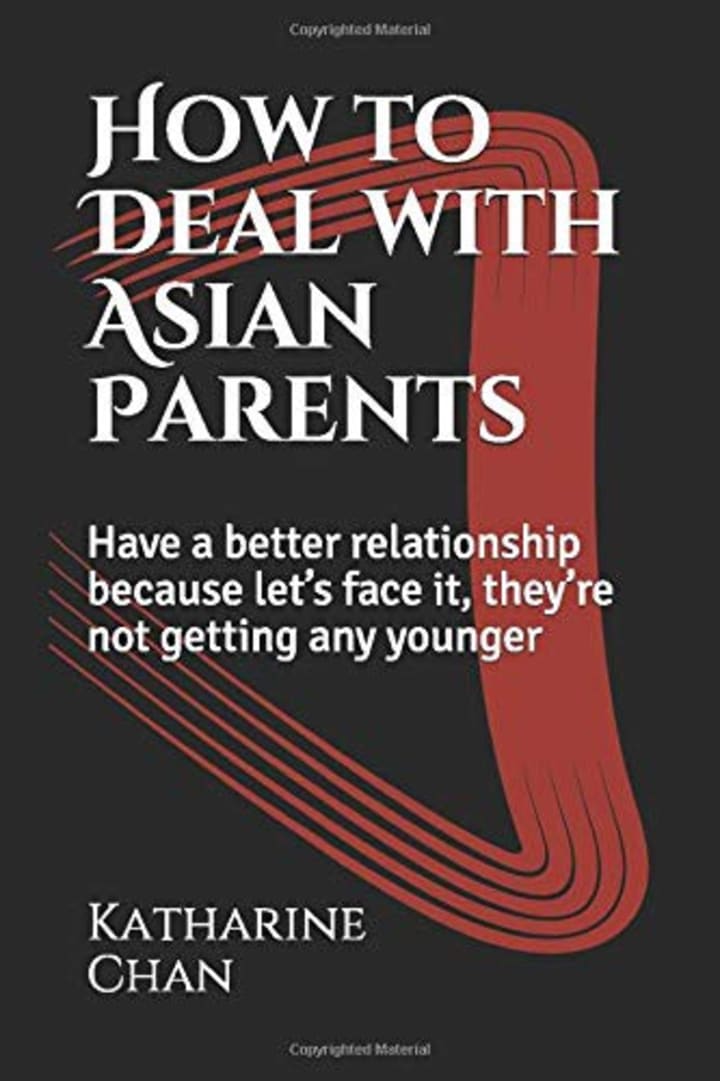4 Questions You Get When Your Book Is Called “How to Deal With Asian Parents”
So earlier this year, I published a book on some strategies that helped my relationship with my parents.


The title of the book assumes that it provides the reader with a clear solution to their problems. But with any self-help, personal development, or relationship advice book, the solution lies within us.
The book serves as a catalyst to provide the reader with courage and validation to do what they need to do. The book gives tools, strategies, tips, and coping mechanisms but at the end of the day, it is up to the person reading it to follow suit.
Here are some questions that I've received:
Question 1:
"Hi Katharine! Saw your Sum of Sleeve post on Asian Hustle Network (AHN) and wanted to reach out since your message about Asian parents resonated with me a lot.
I think all 3rd culture kids feel the generational and cultural differences to a certain extent, but I only recently started to realize that I'm not OK with how my parents and I communicate with each other and how not-so-great our relationships with each other are.
Wanting to make it better, I tried googling some resources but not much came up, so was starting to feel a bit in this attempt…until I saw your post! I'm wondering since starting your blog and reaching an audience, is there a lot of other people who feel this way about their relationship with their parents?
And that they actually want to improve it?
Have you heard back from your readers about how their parents reacted when they tried to have heart to heart conversions and talk about how they feel?
I recently posted on AHN about this and most of the responses came back with…they can't be helped, just nod and smile or sweep it under the rug. Not very hopeful to see that that's how the majority of people interact with their problems. Looking forward to hearing what your thoughts and findings have been!"
My Response:
Such great questions! In my experience, there are many folks who share the same struggles. Some have accepted the relationship and are content with the way things are. They've found a happy medium that works for them. Others want to do something and have tried but it seems like a dead end. Lastly, there are many who have cut ties with their parents and it's worked for them (not a decision to be taken lightly).
Personally, there are days when my parents and I have the best conversations, joking, sharing, and making real strides. And then there are days where they'll say something that pinches my values and I give them attitude.
To be honest, I don't think there is a clear solution to the disconnect and the book doesn't provide the reader with a fairy-tale ending; it's more about finding common ground with our parents so that the relationship is less strained (meaning peaceful social interactions), learning more about ourselves and embracing our past and culture so that we can create a future that we want.
I'm a realistic optimist, making do with what we've got. The bottom line is that we cannot change our parents and who they are; it's about managing our own expectations, accepting them and making an attempt to get to know them so that we can empathize with their mindsets.
Question 2:
"Hmm how do your parents feel about you publishing a book?
I would think they would be embarrassed but I think it's a great subject and probably an interesting book. I have learned a lot with Asian in-laws in 15 years."
My Response:
That's a really good question and thanks for asking :). My parents are not embarrassed actually. They're supportive and encouraging about my pursuit. It's through many conversations and ongoing communication (Google Translate) with tons of patience that I was able to fully explain why I needed to do this. I wouldn't have written a book about my relationship with them if they didn't consent and agree to be a part of it.
They also understand and appreciate the challenges other Asian parents (their friends, family, and peers) have with their grown children and they think it'll help. If you decide to read the book, it explains how I got there.
I appreciate that having Asian in-laws provides some insight into the experience (my in-laws are also Asian) and it can be challenging and frustrating to observe the disconnect between your partner and their parents.
However, in terms of making a living writing a book like this, that's where they're skeptical and not as encouraging. They're still a bit old school in what they think a career should look like. Here's what my mom thought when I told her how much I made last month from writing.
Question 3:
"I'm asking some of my friends how they deal with their parents and so far a lot of them have told me that they don't bother because they know that their parents won't change. Kind of sad to hear really.
Do you think that's the majority of people? They want to have a better relationship with their parents but they know it's a futile effort?"
My Response:
I think it depends on which life stage people are at. Not sure if any of them are parents or are married but I find when people start a new life stage, that's when self-reflection happens about their past. Weddings involve family and having children makes people think about their childhood. Divorces and separation make folks lean on loved ones.
And I think many feel their efforts are futile but a lot of it has to do with our own self-improvement in loving ourselves and embracing where we came from and less about wanting our parents to change. Understanding that makes interactions with our parents more tolerable. It also depends on how often that frustration happens. If it's only once a year…folks are less likely to work on their relationship.
Question 4:
"What if I don't wanna deal with them at all?"
My Response:
That's totally fine! If you've come to accept them for who they are and you are content with the relationship with no desire to change, with no regrets when it comes time for them to leave earth (or for you)…and you have no reason to work on the relationship, then you don't have to deal with them.
Why work on a problem when you don't think you have one?
The first chapter delves deep into your why, as in, why do you want to work on the relationship in the first place.
Why do you want to improve it?
Why is this relationship important to you and how would you want it to change?
Once you get through the chapter and go through the guided self-reflection exercises, it provides the reader with a clearer understanding of where they stand.
The book helps the reader validate what they want. That is sometimes the most challenging part in relationship development, knowing what you want and whether you want to put effort into it; if the conclusion is that they do not have the desire to work on it, then that's an insight they can acknowledge and make peace with.
So Readers, what are your thoughts? Have you tried working on your relationship with your parents?
This was originally published on my website on June 2, 2020
About the Creator
Katharine Chan
Sum (心, ♡) on Sleeve | Author. Speaker. Wife. Mom of 2 | Embrace Culture. Love Yourself. Improve Relationships | Empowering you to talk about your feelings despite growing up in a culture that hid them | sumonsleeve.com/books






Comments
There are no comments for this story
Be the first to respond and start the conversation.